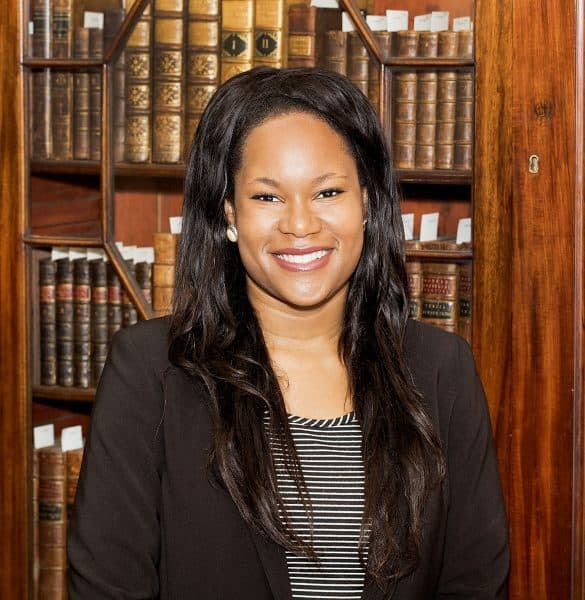A Glimpse of the Mellon Scholars Internship: Abi Bernard
In a series of occasional blog posts, participants in our Mellon Scholars Internship and Workshop programs will introduce themselves, discuss their experiences at the Library Company, and share their goals for pursuing careers in the field of early African American history. This program is generously funded by the Andrew W. Mellon Foundation.
Abi Bernard
Mellon Scholars Intern
My name is Abi Bernard and I am a rising junior studying history and government at Cornell University. During the month of June, I have the privilege of being a Mellon Scholars Intern at the Library Company of Philadelphia (LCP). I was drawn to this program because of my interest in African American history and desire to improve my research skills. After my time at Cornell, I hope to pursue a PhD which combines my love for history and political science, for the ultimate purpose of becoming a college professor. Though I was initially quite unfamiliar of LCP’s auspicious position in historical research and academia, I am incredibly thankful for the wonderful advice, mentorship, and resources I have acquired during my short time here—something I am confident will shape me into a more equipped student and scholar.
Throughout my month at LCP, I will be given a taste of the life of an academic by attending colloquiums, seminars, and professional development workshops; interacting with professors and doctoral candidates; and most importantly, embarking on my own research project. My research paper will focus on African Americans in northern cities and their responses to the Haitian Revolution from the 1820s to the mid-19th century. This topic was of particular interest to me because I did not realize until recently how Haiti is discussed in academia. Most regard Haiti as little more than a failed state and the poorest country in the Western Hemisphere, despite its lucrative past. Long before political turmoil, international aid corruption, and natural disasters ravaged the country, Haiti provided immense hope to enslaved Southern blacks and (for the purpose of my research) Northern blacks living in the unfortunate ambiguity of quasi-freedom. It has been such a wonder to touch and read 180 year-old accounts of the alleged Haitian utopia, and see the joy so many African Americans found in boasting of their brothers’ success in supplanting slavery. The converse is also true, as many blacks learned quickly from news or traveling to Haiti themselves that the country was not all they hoped it would be.
Today the black community seems to be almost completely removed from Haitian affairs, and the Haitian Revolution is rarely more than a short paragraph, next to a painting of Toussaint Louverture, tucked into the corner of a world history textbook, and condensed to simply “the only successful slave revolution.” It is because of this that I have so thoroughly enjoyed learning more about my history as a Haitian American, and I look forward to the many conversations I can start, if only to remind others what a special country Haiti is today and was in the past.
My name is Abi Bernard and I am a rising junior studying history and government at Cornell University. During the month of June, I have the privilege of being a Mellon Scholars Intern at the Library Company of Philadelphia (LCP). I was drawn to this program because of my interest in African American history and desire to improve my research skills. After my time at Cornell, I hope to pursue a PhD which combines my love for history and political science, for the ultimate purpose of becoming a college professor. Though I was initially quite unfamiliar of LCP’s auspicious position in historical research and academia, I am incredibly thankful for the wonderful advice, mentorship, and resources I have acquired during my short time here—something I am confident will shape me into a more equipped student and scholar.
Throughout my month at LCP, I will be given a taste of the life of an academic by attending colloquiums, seminars, and professional development workshops; interacting with professors and doctoral candidates; and most importantly, embarking on my own research project. My research paper will focus on African Americans in northern cities and their responses to the Haitian Revolution from the 1820s to the mid-19th century. This topic was of particular interest to me because I did not realize until recently how Haiti is discussed in academia. Most regard Haiti as little more than a failed state and the poorest country in the Western Hemisphere, despite its lucrative past. Long before political turmoil, international aid corruption, and natural disasters ravaged the country, Haiti provided immense hope to enslaved Southern blacks and (for the purpose of my research) Northern blacks living in the unfortunate ambiguity of quasi-freedom. It has been such a wonder to touch and read 180 year-old accounts of the alleged Haitian utopia, and see the joy so many African Americans found in boasting of their brothers’ success in supplanting slavery. The converse is also true, as many blacks learned quickly from news or traveling to Haiti themselves that the country was not all they hoped it would be.
Today the black community seems to be almost completely removed from Haitian affairs, and the Haitian Revolution is rarely more than a short paragraph, next to a painting of Toussaint Louverture, tucked into the corner of a world history textbook, and condensed to simply “the only successful slave revolution.” It is because of this that I have so thoroughly enjoyed learning more about my history as a Haitian American, and I look forward to the many conversations I can start, if only to remind others what a special country Haiti is today and was in the past.



